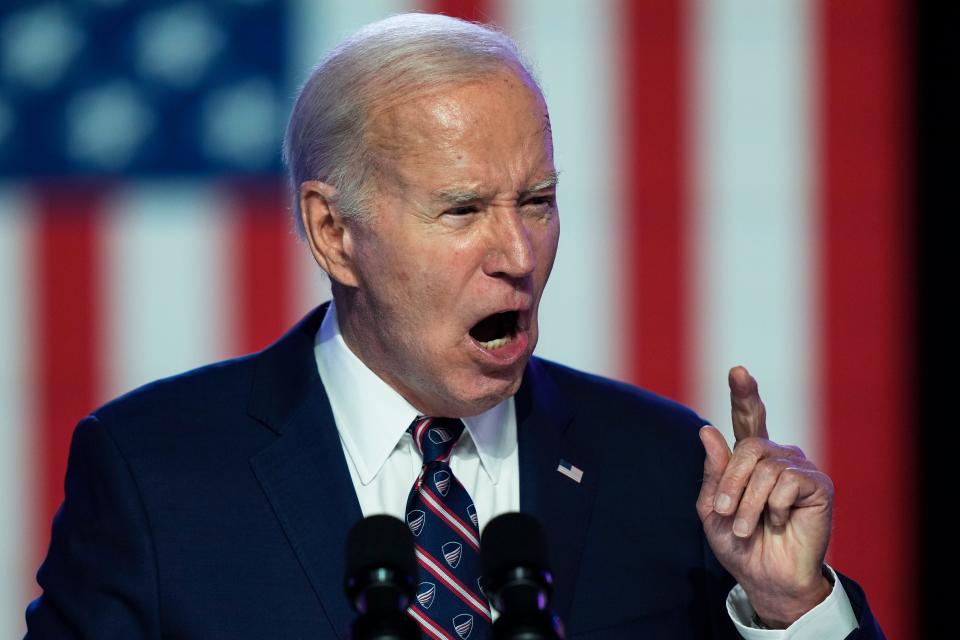Our national debt has topped $34 trillion. Does anyone actually have the guts to fix it?
- Oops!Something went wrong.Please try again later.
- Oops!Something went wrong.Please try again later.
As I write this, I’m getting a strong feeling of deja vu.
For the third time in a little more than a year, our national debt has jumped by $1 trillion. Last week, it hit $34 trillion. In October 2022 – not that long ago – it was $31 trillion, which was a big deal then.
Think about it: In a mere 15 months, the federal government racked up an additional $3 trillion in debt. It took our nation 205 years to accrue its first $1 trillion in debt. Now, we're adding that much red ink every five months. I know inflation is bad, but come on, man.
And while I’d like to think the country’s political leaders will take this seriously, I’m doubtful.

It’s getting old to see our debt spiraling out of control. And depressing, given the real consequences we all will face in the near future if we continue along this current course of irresponsibility. Think higher taxes, rising interest rates and slashed benefits.
Just look up any chart of the nation’s spending over the past few decades, and it’s hard to miss the sharp increase in the last 10 years.
It’s not sustainable.
Now that we’ve reached the $34 trillion mark, alarm bells are going off – for some.
For instance, The New York Times announced that “the debt matters again.” And even liberal economist Paul Krugman has admitted, “Serious deficit reduction, a bad idea a decade ago, is a good idea now.” (If you understand that logic, please let me know.)
Where is Austin? Lloyd Austin hospitalized and Biden is clueless. So much for 'adults being back in charge.'
Meanwhile, in Congress …
Against that serious backdrop of debt, a divided Congress continues to quibble over spending bills that, in the big picture, will make little difference.
Any savings is a good thing, but threats to shut down the government over what’s being discussed is a waste of everyone’s time.
Congress last fall punted on passing comprehensive spending bills to keep the government open, so members have to address it now.

One positive sign is that GOP House Speaker Mike Johnson and Democratic Senate Majority Leader Chuck Schumer say they’ve ironed out a deal. The $1.66 trillion spending pact is similar to the debt ceiling deal that former Republican House Speaker Kevin McCarthy made last year with President Joe Biden.
McCarthy actually gained some serious savings, even after Biden had said he wouldn’t negotiate at all. Yet a small number of Republicans wanted more and booted McCarthy in October.
Separately, Republicans and Biden are ironing out a deal to secure the border in exchange for aid for Israel and Ukraine.
US debt keeps growing. And cowards in Congress keep blaming others for our national debt. Just fix it, already.
If Republicans want to show the American people they can govern, this is the time to do it. More infighting will be a turnoff, and during an election year when Republicans need to pick up more seats, that would be counterproductive.
Is anyone serious about reducing debt?
Both Republicans and Democrats are to blame for the debt. But it’s not a coincidence the debt and deficits are rising so fast under Biden.
Many conservatives in Congress and on the campaign trail like to bemoan the debt, yet few have said that they’d be willing to do what’s really necessary.
The real threat to Social Security: Joe Biden wants you to think GOP is the biggest 'threat' to Social Security. He's wrong.
As Brian Riedl, budget and economics senior fellow at the Manhattan Institute, observed on X: “Seeing elected officials & candidates bemoaning the total federal debt hitting $34 trillion. Unless they support reforming Social Security or Medicare, or raising middle class taxes, you should dismiss their concerns as empty virtue signaling. All other reforms are too small.”
Romina Boccia, director of budget and entitlement policy at the Cato Institute, agrees.
“Given that Medicare and Social Security’s long‐term unfunded obligations (the difference between projected spending and revenues over the next 75 years) jointly make up 95 percent of the federal government’s entire unfunded obligation, there’s simply no way out of the debt crisis without tackling unsustainable entitlement spending,” Boccia wrote recently.
Opinion alerts: Get columns from your favorite columnists + expert analysis on top issues, delivered straight to your device through the USA TODAY app. Don't have the app? Download it for free from your app store.
Unfortunately, it’s not popular to confront that reality. No one wants the government to tamper with their individual Social Security or Medicare payouts, so it’s not something most politicians have the courage to talk about.
But, for the future strength of our country – and to possibly enjoy some of these benefits yourself – start supporting candidates who have the guts to face the problem head-on.
And please save me from having to write another column on the national debt.
Ingrid Jacques is a columnist at USA TODAY. Contact her at ijacques@usatoday.com or on X, formerly Twitter: @Ingrid_Jacques
You can read diverse opinions from our Board of Contributors and other writers on the Opinion front page, on Twitter @usatodayopinion and in our daily Opinion newsletter.
This article originally appeared on USA TODAY: US debt hits $34 trillion. You should care even if Congress doesn't

